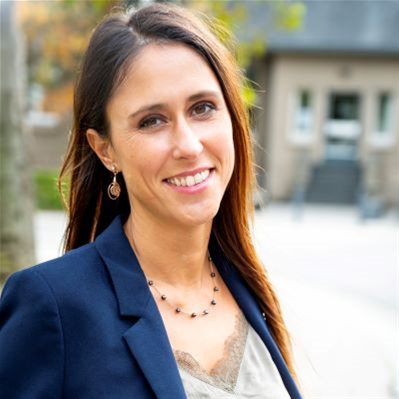The international consultation “Luxembourg in Transition”
The urban-architectural and landscape consultation entitled‘ Luxembourg in Transition – Spatial visions for the zero-carbon and resilient future of the Luxembourg functional region’ aims to gather strategic spatial planning proposals and produce ecological transition scenarios for the Grand Duchy of Luxembourg and neighbouring border regions leading to 2050.
Marie-Josée Vidal

Marie-Josée Vidal
Launched by the Department of Spatial Planning of the Ministry of Energy and Spatial Planning, the urban-architectural and landscape consultation entitled ‘Luxembourg in Transition – Spatial visions for the zero-carbon and resilient future of the Luxembourg functional region’ aims to gather strategic spatial planning proposals and produce ecological transition scenarios for the Grand Duchy of Luxembourg and neighbouring border regions leading to 2050. It was inspired by other large-scale consultations that have been conducted, such as those for Greater Paris and Greater Geneva.
This international consultation is a process that has encouraged the formation of multidisciplinary teams with diverse backgrounds, for a transition-based approach to spatial planning. Instead of a competition between teams, it is a call for bold ideas to be developed in parallel, with the twin objectives of accompanying the actions of decision-makers and strengthening the support of the citizens for the collective project of transforming our way of life through inspiring visions and concrete ideas.
The process is organised in the context of the revision of the Master Programme for Spatial Planning (Programme directeur de l’aménagement du territoire, PDAT), which will be concluded in 2022, and is in line with the EU Green Deal, the National Energy and Climate Plan 2030 and the Sustainable Development Goals of the 2030 Agenda of the United Nations.
The consultation was addressed at professionals, universities, technical institutes and research organisations with expertise in the fields of spatial planning, urban development, landscape planning and architecture, with support from environmental disciplines as well as the humanities and social sciences. In total, 32 teams from all over the world applied to participate. After an internal evaluation in close cooperation with the scientific director of the consultation, 10 teams were selected to take part in the consultation.
Through this consultation, Luxembourg’s Minister for Spatial Planning, Claude Turmes, intends to develop a territorial vision that, on the one hand, contributes to the reduction of Luxembourg’s ecological footprint, which means achieving the objective of zero carbon emissions by 2050, holding the increase in the global average temperature at below 1.5°C and achieving the objective of no net land take by 2050, and, on the other hand, furthers the creation of an integrated cross-border functional region.
The purpose of the citizens’ committee is to discuss and evaluate the results of the different phases, provide feedback to the teams and develop an understanding of how Luxembourg should position itself to achieve climate neutrality by 2050
On a more concrete level, ‘Luxembourg in Transition’ also aims to develop a spatial planning strategy and spatial planning instruments to promote the ecological transition across borders by:
supporting biodiversity, improving ecosystem quality and preserving natural capital;
integrating the aspects of transport, housing, energy and digitalisation;
developing models for a resilient territory; designing tools for economic development that is stable, equitable and solidary.
The process is structured in three stages:
first stage (16 October 2020 until 22 January 2021) – the methodological framework for the transition project;
second stage (1 February 2021 until 4 June 2021) –the transition project adapted to the cross-border functional region;
third stage (14 June 2021 until 22 December 2021) – the transition project staggered and broken down into pilot projects.
The governance structure of the process ‘Luxembourg in Transition’ involves three main bodies:
the Interministerial Committee, under the guidance of the Department of Spatial Planning;
the Consultative Committee, with important (cross-) sectoral stakeholders as well as representatives from the partner authorities in the Greater Region;
the Scientific Committee, composed of 15 eminent scientists and practitioners.
In parallel to these bodies, a citizens’ committee called ‘Biergerkommitee Lëtzebuerg 2050’ was established to accompany the work of the consultation. The purpose of the citizens’ committee is to discuss and evaluate the results of the different phases, provide feedback to the teams and develop an understanding of how Luxembourg should position itself to achieve climate neutrality by 2050.
Claude Turmes, the Minister for Spatial Planning, sought to set up a citizens’ committee that is representative of society in Luxembourg and its cross-border functional region in order to discuss openly the solutions that will be proposed by the teams and make proposals that can serve as inspiration for the work of the department. Indeed, the minister believes that we must give people of all ages and backgrounds living or working in our country the opportunity to give their opinion on subjects related to the future of the territory, and we must have the courage to listen to them.
‘Luxembourg in Transition' aims to develop a spatial planning strategy and spatial planning instruments to promote the ecological transition across borders
With professional guidance, and after receiving, since January 2021, scientific training in the most relevant fields, the citizens actively participate in the discussions and follow a series of conferences and talks. ‘Biergerkommitee Lëtzebuerg 2050 ’can be compared to a people’s university and, at the end of the process, it should be able to make recommendations to political decision-makers and thus contribute to the development of the PDAT.
This approach of active citizen participation is in line with the 2018 participatory process for the revision of the PDAT. In this sense, the committee adopts a pioneering approach in Luxembourg, marking a milestone in the citizen participation process. The minister hopes that throughout the process the committee will become a real laboratory of democracy, this time focusing more specifically on the issue of climate change, its impact on the territory and the role of spatial planning in providing concrete solutions.